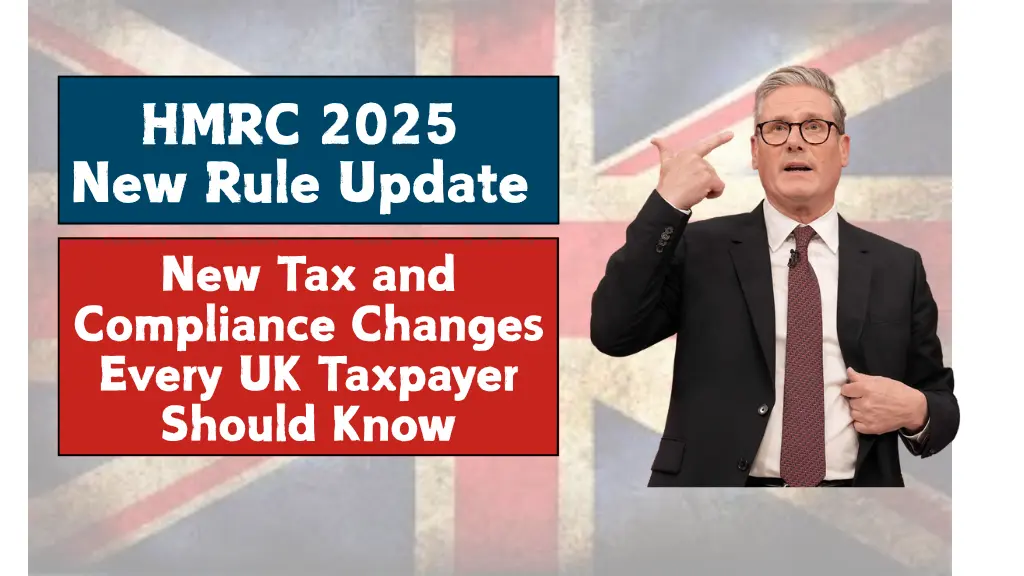HMRC 2025 Rule Update: Her Majesty’s Revenue and Customs (HMRC) has announced several important rule updates for the year 2025 that will impact individuals, businesses, and self-employed workers across the United Kingdom. These changes aim to make the tax system more transparent, improve compliance, and ensure that the government collects revenue efficiently while reducing loopholes. Whether you are a salaried employee, a small business owner, or a freelancer, it is important to understand these updates to avoid penalties and remain compliant with UK tax laws. This detailed article will guide you through the key updates for 2025, including changes to tax rates, reporting requirements, digital services, and penalties.
HMRC 2025 Rule Update
The HMRC 2025 rule changes focus on modernising the tax collection process, closing tax gaps, and encouraging timely reporting. These updates also include stricter rules for digital record-keeping and expanded use of Making Tax Digital (MTD) services, which will now apply to more taxpayers than before. The government has also introduced new penalty structures for late submissions and payments, aiming to make the system fairer by linking penalties to the length and severity of non-compliance.

HMRC 2025 Rule Update Overview
| Authority | Her Majesty’s Revenue and Customs (HMRC) |
|---|---|
| Year | 2025 |
| Main Focus | Tax compliance, digital reporting, penalty reform |
| Key Changes | Tax rate updates, MTD expansion, new penalties |
| Affected Groups | Individuals, businesses, self-employed workers |
| Official Website | https://www.gov.uk/hmrc |
Key Tax Rate Changes for 2025
One of the most significant updates for 2025 involves adjustments to income tax thresholds and national insurance contributions (NICs). The personal allowance has been frozen again, meaning that more taxpayers may move into higher tax brackets due to inflation and wage growth. The higher rate threshold has also been adjusted slightly to account for economic changes. For businesses, the corporation tax rate remains at 25% for large companies, while smaller companies with profits under a certain limit will continue to benefit from the small profits rate. Additionally, changes to capital gains tax allowances mean that individuals selling assets like property or investments will need to pay closer attention to the new lower exemption limits.
Expansion of Making Tax Digital (MTD)
In 2025, HMRC will expand its Making Tax Digital programme to cover more self-employed individuals and landlords. Anyone earning above the new threshold will be required to keep digital records and submit quarterly updates through approved software. This aims to reduce errors in tax reporting and make the system more efficient. For businesses, the MTD requirement will now apply to all VAT-registered companies, regardless of their turnover, meaning even smaller enterprises must comply. Taxpayers who fail to switch to digital reporting may face penalties or late submission fees.
New Penalty System for Late Filing and Payment
HMRC is introducing a fairer penalty system from 2025 that replaces the old automatic fines with a points-based system. Under this new system, taxpayers will receive points for each late submission, and a penalty will only be charged once a certain number of points is reached. This gives more flexibility and understanding for occasional late filers while still enforcing rules for repeated non-compliance. Late payment penalties will now be calculated daily after a short grace period, encouraging faster settlement of outstanding amounts.
Focus on Tackling Tax Avoidance and Evasion
The 2025 rules include stronger measures against tax avoidance schemes, particularly those involving offshore accounts and complex corporate structures. HMRC will have increased powers to demand information from banks, online platforms, and payment processors to identify undeclared income. Businesses engaging contractors or gig workers will also face stricter rules under IR35 legislation to ensure the correct employment status and tax treatment.
Digital Services and Online Accounts
HMRC is encouraging all taxpayers to use their online personal tax accounts to manage their records, check liabilities, and make payments. The updated digital platform for 2025 will offer more real-time data, allowing taxpayers to see up-to-date tax calculations and payment histories. Notifications and reminders for deadlines will be sent through both email and the HMRC app, reducing the risk of missed filings.
What Taxpayers Should Do to Prepare
To stay compliant with the new HMRC rules in 2025, taxpayers should:
- Review the new income tax and NIC thresholds to understand how they affect take-home pay.
- For self-employed and landlords, ensure that digital record-keeping software is ready before the MTD deadline.
- Keep track of all submission and payment deadlines to avoid penalty points.
- Seek advice from a qualified accountant if unsure about new rules, particularly regarding capital gains tax or IR35 compliance.
- Regularly log in to the HMRC online account to check for updates and alerts.
FAQs on HMRC 2025 Rule Update
Individuals, self-employed workers, landlords, and businesses of all sizes will be affected by the new rules.
The expansion of Making Tax Digital and the introduction of the new penalty system are among the most significant changes.
Submit your returns on time, keep accurate records, and ensure payments are made before the due date to avoid penalty points.
The HMRC 2025 rule update introduces significant changes to the UK tax system, focusing on fairness, digital transformation, and stronger enforcement against tax avoidance. While some taxpayers may find the increased digital requirements challenging at first, the long-term benefits include more accurate tax reporting, fewer errors, and better access to personal tax information. Staying informed and preparing early will help individuals and businesses adapt smoothly to these changes while avoiding unnecessary penalties.